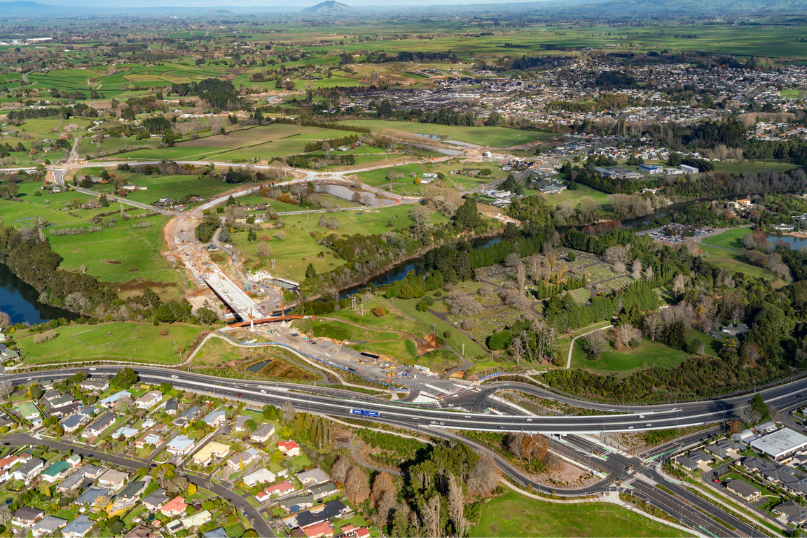
Hamilton, HEB Construction, new zeland,
893 views
Suggestions that Hamilton City Council is being ripped off by contractors on the city’s biggest construction projects are false said Chief Executive Lance Vervoort.
Vervoort has clarified statements made in the past week regarding the costs of infrastructure projects, particularly in new growth area of Peacocke.
“Council doesn’t write blank cheques for projects in the city, and we negotiate hard to deliver the best value for residents now and for the thousands of new people that will call Hamilton home in the future.
“The new bridge to connect Peacocke to the rest of the city is one of our most complex and transformative projects. It has been delivered during COVID-19 and major weather events like Cyclone Gabrielle which have had significant impacts on critical material and labour costs. Yet still, the project is being delivered on time and within the budget approved by Council,” he said.
The construction contract for the new bridge to Peacocke was originally awarded in 2020 to HEB Construction for $135 million. This contract includes an additional pedestrian bridge, 1.6km of new and upgraded roads, wastewater pipes and a new roundabout.
Increases of $23.2 million have since been approved by Council ($2.1 million for costs associated with COVID-19 and $21.1 million for inflation). Council has also approved $5 million of additional works fully funded by developers, to be added to contract. The current contract value is $163.2 million.
“Like most projects of this size and scale across the country a reasonable contingency is always allowed for in our contracts, however some extremes you just can’t plan or allow for. This includes the significant inflation increases since the budgets were set in 2018. We’re proud of the way staff have worked with contractors to navigate these challenges.”

The cost of this project includes supporting infrastructure around the bridge.
Construction costs for infrastructure in Peacocke will largely be funded by development contributions (around 90%) with just 10% coming from rates which follows Council’s financial strategy that growth pays for growth.
Rates in Hamilton are proposed to increase by 19.9% in 2024/25, largely due to inflation, interest rate hikes, government compliance and depreciation.
But it’s not the case to say the costs of strategic infrastructure projects, like those in Peacocke, are to blame, Vervoort said.
“We need more of these high-trust funding models with central government to deliver all the infrastructure in the city, not just the parts that will be paid for by developers.”
Peacocke bridge costs: a timeline
August 2020 – Council awards $135 million construction contract, using inflation assumptions in 2018 Long-Term Plan.
September 2021 – Council approves an increase to the contract of $5 million to $140 million to add additional work done on behalf of local developers. This work is 100% funded by the developers.
June 2022 – Council approves an $20.2 million increase to the contract ($2.1 million for cost increases related to COVID-19 and $18.1 million for inflation).
October 2023 – Council approves a $3 million increase to $163.2 million for inflation.
Peacocke is being built with the support from the Government’s Housing Infrastructure Fund, made up of a $180.3 million 10-year interest-free loan and $110.1 million of Waka Kotahi NZ Transport Agency subsidies.
The Peacocke programme will deliver a new bridge, a transport network that caters for public transport, pedestrians and cyclists, parks, and strategic water, wastewater and stormwater networks. Other work includes protecting and enhancing the environment, including the extensive gully system, opening the area to the Waikato River, and investigating community facilities which are also important parts of creating a new community in Peacocke.
When completed, Peacocke will be home for up to 20,000 Hamiltonians.
Source: © Hamilton City Council 2024
Project Spotlight: New Zealand’s Takitimu North Link
1071 views
Takitimu North Link is a major infrastructure project designed to improve safety and connectivity in the Bay of Plenty region of New Zealand.
Project Spotlight: Te Ara o Te Ata – Mt Messenger Bypass
974 views
The $280m Mt Messenger Bypass project is a new 6km highway that will provide a safer route for commuters travelling in Taranaki, New Zealand.



